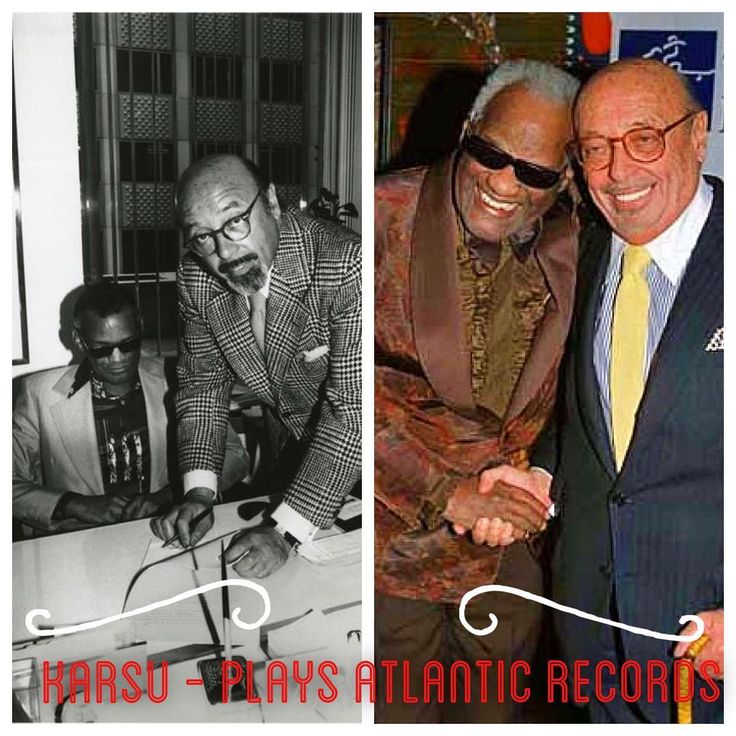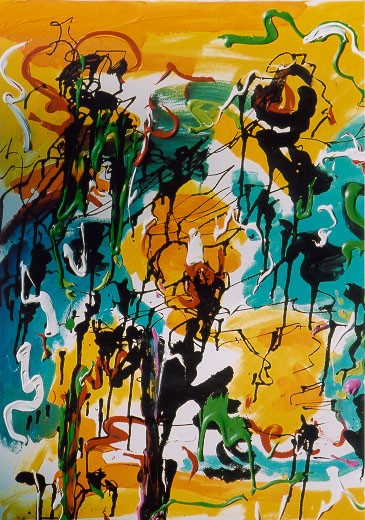When Atlantic Records Traded R&B for Rock ‘n’ Roll
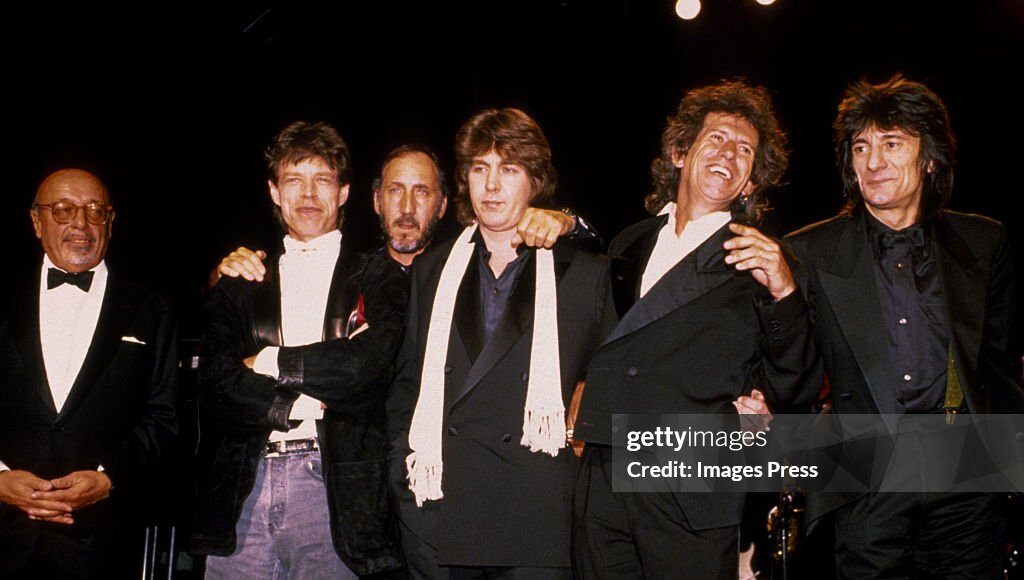
AHMET ERTEGUN, along with Mick Jagger, Pete Townshend, Mick Taylor, Keith Richards, and Ronnie Wood, attend the 1989 Rock n Roll Hall of Fame Induction Ceremony in New York City. Photo by Sonia Moskowitz/IMAGES/Getty Images
After Ray Charles departed Atlantic Records, Ahmet Ertegun banked on long-haired rockers.
The great Ahmet Ertegun: the son of a Turkish ambassador. A speaker of many languages. The recipient of an elite education. Ertegun could have followed his father into the diplomatic corps. Instead, he parlayed his genuine love for jazz and rhythm & blues (“race music,” as it was called back then) into founding a franchise, Atlantic Records, that would make him rich and famous.
When Ertegun founded Atlantic in 1947, the world was ready for the kind of music the label offered. This was a transformational time: Jackie Robinson had broken the color barrier in baseball, jazz, a creature of Prohibition, would become America’s music, and Black artists would slowly but surely follow Elvis Presley into the radio mainstream.
The Great Ray Charles
Ertegun’s first big-time artist was the great Ray Charles, who headed Atlantic’s roster of up-and-coming R&B performers. Along with his partner Jerry Wexler, Ahmet was present in February 1959, when Charles improvised a recording that would become the hit, “What’d I Say.” Robert Greenfield, author of The Last Sultan:
Combining elements of jazz, gospel, and the call-and-response of Mississippi Delta field blues into a mind-blowing synthesis of filthy funk and non-stop driving rhythm, the track was unlike anything anyone had ever heard before, much less recorded.
“What’d I Say” spent 15 weeks on the pop charts. It sold over a million copies, making it Charles’s first gold record. But as Ray Charles’s contract was about to expire, he had bigger royalties, not Georgia, on his mind. Despite constant pleading and courting by Ertegun, Charles left Atlantic for ABC-Paramount for a reported unheard-of 75-25% split in favor of the artist’s royalties.
Selling Out
The loss of Charles hurt Ahmet badly, especially in light of his remarkable track record with Black artists. All of the great ones paid homage to Ertegun, who in turn loved them back and made them (and Ertegun) wealthy.
In 1967 Atlantic was sold to Warner Bros. for an amount that Wexler described as something of a joke. Sensing another round of payola hearings in Congress, Ertegun went along with the sale. The trail-blazing mogul was having his doubts:
What the industry generally called the Atlantic Sound was eventually superseded by the Motown Sound, which was fabulous. It got me right away, and I didn’t know how to reproduce it and it scared the shit out of me. It was newer and hipper than what we were doing, and it got to the public in a very heavy way and became pop music.
Ertegun and Wexler retained their management positions and made a decision: When in Rome… Atlantic would go after the long-haired white boys.
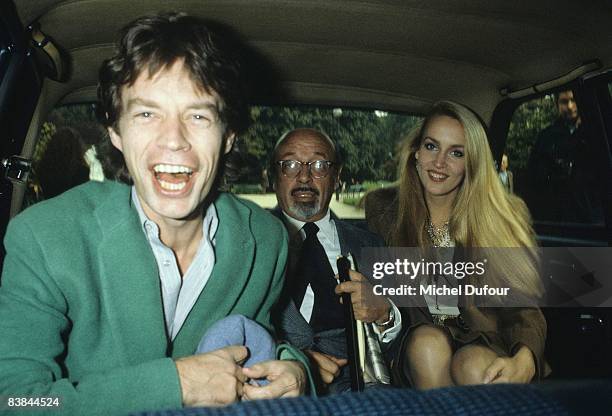
Ertegun with Mick Jagger and Jerry Hall outside Cecconi’s in Paris, 1983. Photo by Michel Dufour/WireImage
Romancing the Stones
The Rolling Stones always regarded themselves as a blues-oriented band and admired the Atlantic Sound from afar. The Stones were far from wealthy due to an unwise management deal with Allen Klein, who somehow acquired the copyrights to all of the Stones’ ’60s recordings. So when their contract with London Decca Records expired in 1970, it was Mick Jagger who courted Ahmet Ertegun. The two would become lifelong friends.
On April 1, 1971, the Stones signed a deal with Atlantic that would guarantee the band an advance of $1 million per record album for five albums and a royalty rate of over 10 percent per record. The Stones would have their own label, Rolling Stones Records (with the distinctive tongue), and their own manager: Marshall Chess, son of the founders of the famous blues label Chess Records. For Jagger and his mates, it was a dream come true.
For a detailed account of the Stones/Atlantic alliance, read my article here.
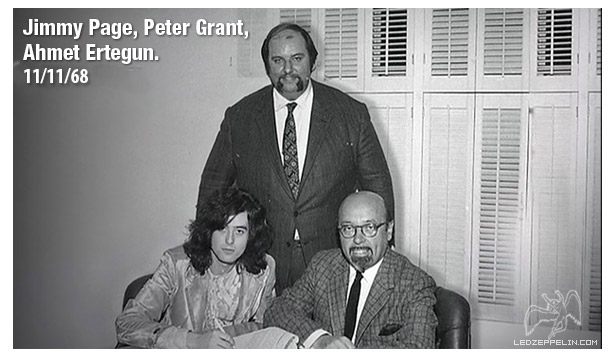
Ahmet Ertegun signs Led Zeppelin to Atlantic Records. That’s Jimmy Page and manager Peter Grant. Source: ledzeppelin.com
Led Zeppelin
Other big rock acts would follow the Stones into the Atlantic fold: Cher, Led Zeppelin, Crosby, Stills & Nash, among others. Many of rock’s biggest musicians were in awe of this old-school record-maker. Led Zeppelin’s Robert Plant:
Right in the middle of the eye of the storm was this absolutely elite gentleman, the master of serenity, as much at home with the backstage cavorting of Led Zeppelin as he was with the politeness of high society. We had some memorable nights together; I wish I could remember them. He was, to me, an oasis and a model–how to be settled in the midst of all this madness…
Ahmed Ertegun biographer Robert Greenfield observed that whenever Led Zeppelin was touring in the US, Ertegun made a point of showing up before the band went onstage. Ertegun would partake in any substance being passed back and forth, and then fly with the band to its next gig. Atlantic co-founder Jerry Wexler noted, “Ahmet was the guy who went to the concerts and dealt with the managers. He plunged into it heart and soul. He became their friend and it was those efforts that made Atlantic a monster company.”
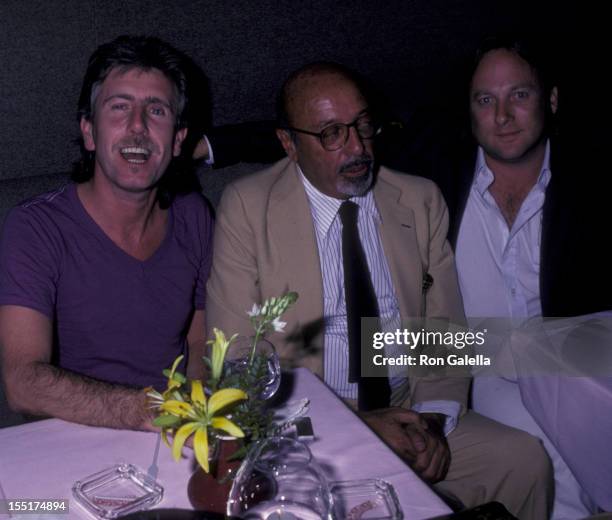
(L-R) Stephen Stills, Ahmet Ertegun, and Graham Nash attend the Crosby, Stills & Nash Concert Party on August 13, 1982, at the Berkshire Hotel in New York City. (Photo by Ron Galella/Ron Galella Collection via Getty Images)
Crosby, Stills & Nash
Legend has it that when Crosby, Stills & Nash performed an acoustic audition for Atlantic, Ertegun interrupted the first song, took out his checkbook and said, “Fill in the number. I don’t care–whatever it is doesn’t matter.”
CSN signed with Atlantic for six albums. A record a year for six years. My point is that Ahmet kept all those fuckers away from us. All those lawyers who said, ‘Hey, the contract says…’ And Ahmet would be the one who said, ‘Hey, leave them alone. Whatever they do, we will take.’ No record guy ever got along better with his artists.
Coda
Atlantic Records lives on under the Warner Music Group umbrella. Its current roster includes such artists as Ava Max, Bruno Mars, Cardi B, Coldplay, Death Cab for Cutie, Lizzo, Matchbox Twenty, and Missy Elliott.
Ahmet Ertegun died on December 14, 2006, at age 83. Doug Morris, former CEO of Universal Music Group, had this to say one year prior:
When Ahmet dies, he will have squeezed the tube of life completely dry. And they’ll have to bury him facedown or he’ll dig his way out.
Please report any Ahmet Ertegun sighting.
